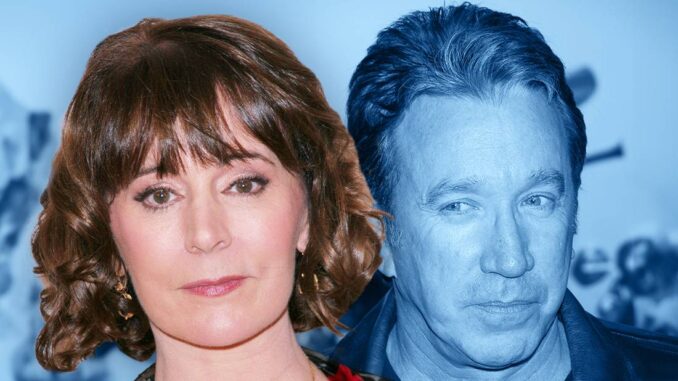
The Unplugged Truth: When the Tool Man’s Narrative Fails
For millions, Home Improvement was more than just a sitcom; it was a weekly dose of Americana, a reassuring hum of familial squabbles and the comforting rumble of a souped-up lawnmower. Tim “The Tool Man” Taylor, played by the affable Tim Allen, became the embodiment of the well-meaning, slightly bumbling patriarch, whose on-screen foibles were always smoothed over by the wisdom of his wife, Jill (Patricia Richardson), and the sage advice of his neighbor, Wilson. When the show concluded its eight-season run in 1999, the prevailing narrative, largely championed by Allen himself, was that the star had gracefully stepped away to prioritize family time, choosing the sanctity of his personal life over the glare of the spotlight. It was a perfectly crafted, heartwarming ending that neatly tied a bow on a beloved era of television.
Yet, nearly a quarter of a century later, the carefully constructed facade has begun to crack. The wrench in this nostalgic machine has been thrown by none other than Patricia Richardson, the very woman who played Allen’s on-screen anchor for so many years. Her recent statements, echoed implicitly by other cast members like Richard Karn (Al Borland), accuse Tim Allen of peddling a convenient untruth about the show’s conclusion. The assertion is stark: Home Improvement didn't end because Tim Allen nobly chose family; it ended because he was, to put it mildly, difficult, expensive, and ultimately, responsible for its demise.
Allen’s long-held narrative painted a picture of a man making a noble sacrifice. He often spoke of wanting to spend more time with his daughter, citing the grueling schedule of a hit network show as incompatible with his family priorities. This resonated with the public, fitting neatly into the archetype of the grounded celebrity who valued real life over fame. It allowed fans to believe in a bittersweet, yet admirable, conclusion to a show they loved, preserving the wholesome image of its star.
But Richardson's account dismantles this. In various interviews, she has illuminated a far less idyllic reality. She claims that Disney, the studio behind the show, was not only desperate to keep it going but was prepared to offer Allen an astronomical sum – reportedly upwards of $50 million – for a ninth season. The show was still a ratings powerhouse, and the network was willing to pay a king’s ransom to maintain its golden goose. The issue, according to Richardson, was not Disney’s unwillingness, but Allen’s. She described him as having become increasingly demanding and difficult, and that his asking price, coupled with his alleged on-set behavior, effectively became a poison pill that no studio, no matter how rich, could swallow. “He was offered way, way, way too much money,” she stated, adding that even with the immense offer, Allen “walked away.” The implication is clear: it wasn't a noble exit for family; it was a business decision, or perhaps more accurately, a consequence of one star’s leverage, demands, and alleged temperament.
This divergence in narratives is more than just a squabble over historical facts; it’s an illustrative case study in the construction and deconstruction of celebrity mythologies. For the cast members like Richardson and Karn, who were integral to the show’s success but perhaps lacked the singular star power of Allen, his long-held version of events may have felt like a usurpation of their collective experience. It rewrote a shared history, placing the burden of the show's end on a benevolent personal choice rather than complex professional realities or interpersonal dynamics. It diminished their roles in its legacy, implicitly suggesting that the show was solely Allen's to begin with, and his to end.
The lie, if Richardson's account is accurate, is not merely one of omission, but of calculated reframing. It paints Allen as a sacrificing family man rather than a shrewd, demanding, or potentially problematic figure in the workplace. It shifts the blame, or at least the true reason for the show’s end, away from his personal actions and financial demands, onto a more palatable, universally admired motive. This kind of narrative control is common in Hollywood, where public perception is a carefully curated product, often far removed from the messy realities of production.
For fans, this revelation is like discovering a crack in the foundation of their beloved Binford Tools workshop. It forces a re-evaluation of the show's past, casting a shadow over the "Tool Man's" folksy charm. It reminds us that behind the laughter and the wholesome family values portrayed on screen, there were complex human dynamics, financial negotiations, and the often-fraught relationships inherent in any high-stakes production. The idealized image of the Taylors—a family whose problems were always fixable by "more power"—contrasts sharply with the off-screen reality of a show that reportedly ended not due to mutual agreement or organic conclusion, but due to a star’s unyielding stance.
Ultimately, the accusations hurled by Patricia Richardson and other Home Improvement cast members against Tim Allen serve as a potent illustration of how history is written by the powerful, and how truth, in the celebrity sphere, can be a tool wielded to shape public opinion. The story of Home Improvement's ending, once a comforting tale of a star's noble sacrifice, now stands exposed as a potentially more complicated, and perhaps less admirable, saga. The “Tool Man” may have always sought "more power," but in this instance, that pursuit, or its consequences, might have been what ultimately unplugged the show.